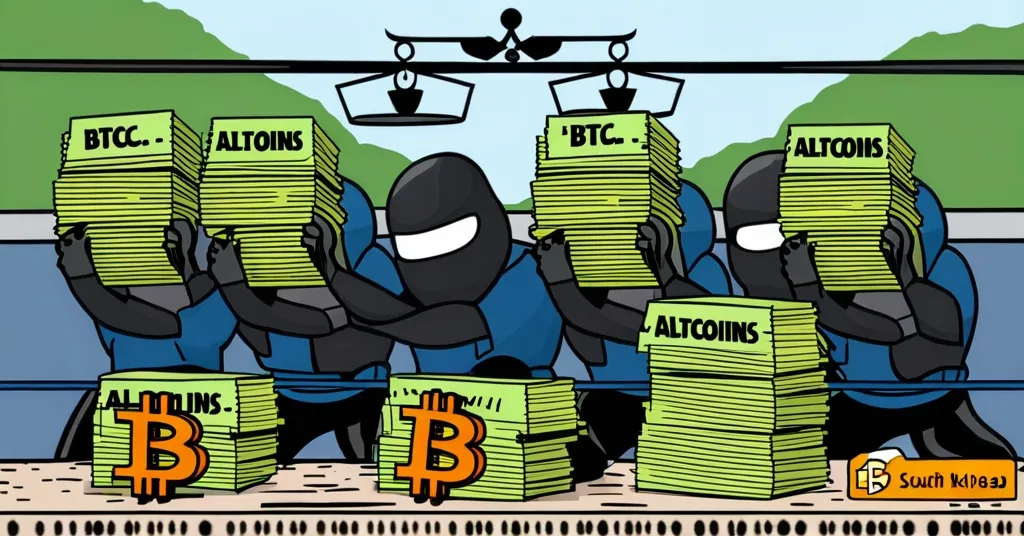South Korean Court Sentences Crypto Gang for Exploiting Kimchi Premium

South Korean Court Jails Kimchi Premium Crypto Trading Gang
A South Korean court has sentenced four members of a “kimchi premium” crypto trading gang to jail, following their exploitation of the price disparity between cryptocurrencies in South Korea and international markets.
- South Korean court sentences four for exploiting kimchi premium.
- Gang smuggled $273.7 million out of South Korea.
- Ringleader “A” jailed for 3.5 years, fined over $2 million.
The Daegu District Court in South Korea has handed down jail sentences to four members of a gang that capitalized on the “kimchi premium,” a phenomenon where cryptocurrencies like Bitcoin (BTC) and other altcoins trade at higher prices in South Korea than on global exchanges. This disparity often stems from high domestic demand coupled with stringent capital controls, making it challenging for locals to engage in arbitrage—essentially, the practice of buying low and selling high across different markets.
The gang, led by a 43-year-old man known only as “A,” managed to purchase tokens from Japan and resell them in South Korea during a time when the kimchi premium soared to over 35% between 2020 and 2021. Their operation involved smuggling approximately $273.7 million in foreign currency back to their Japanese investors, while pocketing $18.5 million in service fees. Altcoins, which are cryptocurrencies other than Bitcoin, were also part of their trading strategy.
The court found the gang guilty of violating two significant laws: the Act on Reporting and Use of Specific Financial Transaction Information, which we’ll call the Financial Transaction Information Act for simplicity, and the Foreign Exchange Transaction Act. The ringleader “A” was sentenced to three and a half years in prison and fined over $2 million. Other members received sentences ranging from two years and two months to a suspended 18-month sentence with community service.
Despite their elaborate schemes, the defendants attempted to deny the charges, asserting that their transactions with Japanese investors were not capital transactions. However, the judge dismissed this claim, highlighting the use of fake invoices and contracts to deceive banks and mask their cryptoasset sales. Cryptoassets refer to digital assets such as cryptocurrencies and tokens.
This case sheds light on the shadowy side of the crypto world, where market inefficiencies can be manipulated for illicit gains. It also underscores South Korea’s stringent regulations on cryptocurrency trading and foreign exchange, which, while aimed at protecting the economy, inadvertently provide fertile ground for such illegal activities.
The kimchi premium isn’t just a South Korean quirk; it has broader implications. It affects overseas remittances and provides arbitrage opportunities for foreign investors. Emerging in 2016, the premium reached a staggering 55% in January 2018, driven by South Korea’s tech-savvy populace and geopolitical tensions. Understanding this historical context offers a clearer perspective on the phenomenon’s influence and the regulatory challenges it presents.
While it’s easy to focus on the negatives, it’s worth considering that the kimchi premium could have potential benefits if managed legally. For instance, it could facilitate legitimate arbitrage for those who navigate the regulations appropriately, thereby promoting market efficiency. However, current regulations might be too restrictive, stifling such opportunities and driving more people to exploit loopholes illegally.
Looking forward, the balance between regulation and innovation will remain a critical issue. South Korea, and indeed the global community, must find ways to prevent exploitation without hampering the growth of decentralized technologies. This case serves as a stark reminder of the ongoing battle between maintaining financial stability and fostering the evolution of the crypto ecosystem.
The impact of the kimchi premium on global crypto markets is significant, and discussions on platforms like Reddit highlight the public’s interest and concern about such cases.
Key Takeaways and Questions
-
What is the kimchi premium?
The kimchi premium is the phenomenon where cryptocurrencies trade at higher prices on South Korean exchanges due to high domestic demand and capital controls.
-
What were the gang’s activities?
The gang bought tokens from Japan and resold them in South Korea, exploiting the kimchi premium, and then smuggled foreign currency back to Japanese investors.
-
What laws did the gang violate?
The gang violated the Financial Transaction Information Act and the Foreign Exchange Transaction Act.
-
What were the sentences given to the gang members?
The ringleader “A” received three and a half years in prison and a fine over $2 million. Other sentences included two years and two months, two years, and a suspended 18-month sentence with community service.
-
How did the gang attempt to hide their activities?
They used fake invoices and contracts to deceive banks and hide their cryptoasset sales.
-
What potential benefits could the kimchi premium offer if managed legally?
If managed legally, the kimchi premium could facilitate legitimate arbitrage, promoting market efficiency and potentially benefiting the economy.
-
How might South Korea’s regulatory approach change in the future?
South Korea might need to balance its regulations to prevent exploitation while fostering innovation, possibly by easing capital controls to allow for legal arbitrage opportunities.


